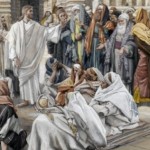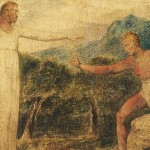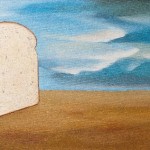 Mark 8:11-26
Mark 8:11-26
Poor, stupid, disciples. They just don’t get it, do they?
Their conversation with Jesus goes something like this:
“Take heed, beware of the leaven of the Pharisees and the leaven of Herod.”
Stunned silence. Gears slowly grinding in 12 crania. Let’s see, Jesus just fed the 4000 thousand . . . and we only have one loaf of bread.”
“Hey guys – I think what He’s saying has something to do with bread.”
“Of course it does – He mentioned leaven.”
“Bread . . . lots of bread . . .”
“I’ve got it! It’s because we have no bread.”
“Just what are you saying?”
“I’m saying we have no bread.”
“So what? What does that have to do with leaven of the Pharisees and Herod?”
Jesus, being aware of their confused conversation, is astonished by their lack of understanding.
“Don’t you understand? Are you worried because you have no bread? Is that why you think I’m concerned about you?”
Poor, stupid disciples. They just couldn’t see. Jesus has just taken 5 loaves and 2 fish and fed 5000 men (plus women and children.) Then he had taken 7 loaves of bread and a few small fish and had fed 4000.
And then the disciples, having only one loaf, are worried that they don’t have any food. The disciples seem dumb to the point of ridiculousness. I might understand that they don’t understand what the leaven of the Pharisees is, but how can they not understand that Jesus is able to give them bread? The disciples are worried about not having enough bread when the Bread of Heaven is in the same boat with them.
Poor, stupid disciples.
And then it dawns on me that I am, too, am a disciple. Poor, stupid disciple. Like the 12, we are concerned about physical bread, when the Bread of Life dwells inside us through His Holy Spirit. Like the disciples, we are earthly minded, when Jesus is trying to teach us the things of heaven.
My own belief is that the leaven of the Pharisees and Herod, who rejected Jesus as the Messiah and Savior, is probably their unbelief. “Beware that you are not unbelieving as the Pharisees and Herod. Take heed that you understand and remember who I AM,” Jesus is saying.
Like those disciples, we are slow to learn. How often we forget the Bread of Life! How often we forget that Jesus, the Savior, is here with us. And so we worry about what we will eat or drink or what we will put on. We worry about the bills and the kids and our job and our house. When all along the one who fed the 5000 and 4000 is with us. Like the disciples, right after Jesus has fed the 5000 and 4000, we only take away one loaf. We are slow to treasure the Bread of Life, we are slow to take Him with us, and we are slow to eat Him. And therefore we are slow to grow.
The fact is, it takes time and effort and a life of dedication to become a disciple of Jesus Christ. We laugh at the disciples sometimes because they are so slow to “get Jesus.” But we’re the same way. Having the advantages of a Resurrected Christ and the Holy Spirit dwelling in us, we’re still slow to “get Jesus.”
Discipleship is a lifelong process that results from a daily feeding off of Jesus Christ. We must eat Jesus, the Daily Bread whom we ask for every day in the Lord’s Prayer. We must read His Word. Both Augustine and Jerome applied the feeding of the 4000 to our eating of the Word of God. St. Augustine wrote: “In expounding holy Scriptures, I am, so to speak, now breaking bread for you.”
We think the disciples are stupid or slow learners, but so are we all. We understand that children learn from repetition, but as adults we are impatient and think we should learn from osmosis or from an immediate transfusion of knowledge and holiness.
As disciples we learn from repetition. As disciples we learn from repetition.
I can’t get inside the heads of the compilers of the 1928 Prayer Book lectionary, but you’ll notice that we skipped Mark 8:1-10 in our readings. It’s the Feeding of the 4000, and I think maybe the 1928 lectionary skips it because we just heard about the Feeding of the 5000. It’s boring to read the same thing twice.
I, too, wonder why the Gospel of Mark, already the shortest Gospel, bothers repeating 2 similar incidents so close together. Maybe it’s because we, like the 12, are disciples in progress who don’t get it the first time. Maybe we need to hear these stories again and again because we haven’t really understood them or we’ve forgotten. One thing I’ve discovered is that wherever there is repetition in Bible it’s important. Take heed! Pay attention!
How patient Jesus is with the 12, and how patient He is with us. How often we are dull of understanding, forgetful, or sinful, and yet the Master continues to draw us back to Him. Jesus Christ almost never “takes” the first time. We come to Him step by step and day by day. Sometimes we take steps backwards. If you’ve watched the process of conversion, it’s almost never an instantaneous event. It started a long time ago when someone first planted the seed. That seed germinated invisibly. Probably, there were others who planted seeds. Many come and water, and their work, too, is invisible and remains unnoticed. After, often, a long time of struggling, the life in Christ finally seems to take, but then the long process of true discipleship is only ready to begin in earnest through a daily life of prayer and the Word and a weekly life of worship and instruction among God’s people.
This principle of the slow growth of disciples is illustrated in verse 25, when Jesus heals the blind man. Unlike most of Jesus’ other miracles, this man is not fully healed the first time Jesus touches him. The first time, he sees “men, walking like trees.” His eyes are healed, but not completely. Jesus must come to Him again and heal him further.
This is a picture of the life of the disciple. Jesus must come to us poor, stupid disciples many, many times. In fact, He needs to come to us every day and every moment. We should not, therefore, be discouraged if we seem slow to understand and hard of heart: this is the normal condition of the disciple.
How long did it take for Europe to be “Christianized”? Centuries! The gospel reached parts of Europe in the first century, and Constantine converted in the early fourth century. But if you’ve ever read Beowulf, written around the eighth century, you realize how imperfectly Christianized Europe was centuries after Constantine. If you were to travel beyond the cities to a medieval village, you’d be shocked at how little Christ had entered into the heart of Europe, even by the fifteenth century.
Discipleship is a day by day process of following Jesus Christ. We will be hard of hearing and dull of heart and stupid all along the way.
But the wisdom of the disciple is in acknowledging his hunger and remembering that right beside him is the Bread of Life and that if he would only feed off Jesus he would never be hungry again.
Prayer: Father, I thank You for sending Your Son, the Bread of Heaven, down to earth to feed me. Give me a hunger for Him every day that I might fill my soul with the Bread that gives eternal life. Heal my blindness that I might see You through Your Son. Amen.
Point for Meditation:
Meditate on the nature of physical hunger. Reflect on how your physical hunger leads you to seek food. Apply this to your spiritual hunger that you might more quickly seek to fill your soul with Jesus Christ.
Resolution: I resolve to seek Jesus Christ, the Bread of Life, through prayer and the Word. If I have not been faithful in eating Him in either of these ways, then I resolve to come back to Him today.
© 2015 Fr. Charles Erlandson















